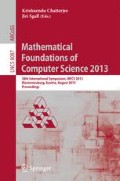Abstract
We examine the algorithmic tractability of NP-hard combinatorial feature selection problems in terms of parameterized complexity theory. In combinatorial feature selection, one seeks to discard dimensions from high-dimensional data such that the resulting instances fulfill a desired property. In parameterized complexity analysis, one seeks to identify relevant problem-specific quantities and tries to determine their influence on the computational complexity of the considered problem. In this paper, for various combinatorial feature selection problems, we identify parameterizations and reveal to what extent these govern computational complexity. We provide tractability as well as intractability results; for example, we show that the Distinct Vectors problem on binary points is polynomial-time solvable if each pair of points differs in at most three dimensions, whereas it is NP-hard otherwise.
Vincent Froese was supported by DFG, project DAMM (NI 369/13). René van Bevern and Manuel Sorge were supported by DFG, project DAPA (NI369/12).
Access this chapter
Tax calculation will be finalised at checkout
Purchases are for personal use only
Preview
Unable to display preview. Download preview PDF.
References
van Bevern, R.: Towards optimal and expressive kernelization for d-hitting set. Algorithmica (2013)
Blum, A., Langley, P.: Selection of relevant features and examples in machine learning. Artificial Intelligence 97(1-2), 245–271 (1997)
Brandstädt, A., Mosca, R.: On distance-3 matchings and induced matchings. Discrete Appl. Math. 159(7), 509–520 (2011)
Bredereck, R., Chen, J., Hartung, S., Kratsch, S., Niedermeier, R., Suchy̌, O.: A multivariate complexity analysis of lobbying in multiple referenda. In: Proc. 26th AAAI, pp. 1292–1298 (2012)
Charikar, M., Guruswami, V., Kumar, R., Rajagopalan, S., Sahai, A.: Combinatorial feature selection problems. In: Proc. 41st FOCS, pp. 631–640 (2000)
Chen, J., Chor, B., Fellows, M., Huang, X., Juedes, D., Kanj, I.A., Xia, G.: Tight lower bounds for certain parameterized NP-hard problems. Information and Computation 201(2), 216–231 (2005)
Christian, R., Fellows, M.R., Rosamond, F., Slinko, A.: On complexity of lobbying in multiple referenda. Review of Economic Design 11(3), 217–224 (2007)
Dasgupta, A., Drineas, P., Harb, B., Josifovski, V., Mahoney, M.W.: Feature selection methods for text classification. In: Proc. 13th ACM SIGKDD, pp. 230–239 (2007)
Dom, M., Lokshtanov, D., Saurabh, S.: Incompressibility through colors and IDs. In: Albers, S., Marchetti-Spaccamela, A., Matias, Y., Nikoletseas, S., Thomas, W. (eds.) ICALP 2009, Part I. LNCS, vol. 5555, pp. 378–389. Springer, Heidelberg (2009)
Downey, R.G., Fellows, M.R.: Parameterized Complexity. Springer (1999)
Flum, J., Grohe, M.: Parameterized Complexity Theory. Springer (2006)
Forman, G.: An extensive empirical study of feature selection metrics for text classification. J. Mach. Learn. Res. 3, 1289–1305 (2003)
Guyon, I., Elisseeff, A.: An introduction to variable and feature selection. J. Mach. Learn. Res. 3, 1157–1182 (2003)
Koller, D., Sahami, M.: Towards optimal feature selection. In: Proc. 13th ICML, pp. 284–292 (1996)
Moser, H., Thilikos, D.M.: Parameterized complexity of finding regular induced subgraphs. J. Discrete Algorithms 7(2), 181–190 (2009)
Niedermeier, R.: Invitation to Fixed-Parameter Algorithms. Oxford University Press (2006)
Pawlak, Z.: Rough Sets: Theoretical Aspects of Reasoning about Data. Kluwer Academic (1991)
Skowron, A., Rauszer, C.: The discernibility matrices and functions in information systems. In: Slowinski, R. (ed.) Intelligent Decision Support—Handbook of Applications and Advances of the Rough Sets Theory, pp. 331–362. Kluwer Academic (1992)
Author information
Authors and Affiliations
Editor information
Editors and Affiliations
Rights and permissions
Copyright information
© 2013 Springer-Verlag Berlin Heidelberg
About this paper
Cite this paper
Froese, V., van Bevern, R., Niedermeier, R., Sorge, M. (2013). A Parameterized Complexity Analysis of Combinatorial Feature Selection Problems. In: Chatterjee, K., Sgall, J. (eds) Mathematical Foundations of Computer Science 2013. MFCS 2013. Lecture Notes in Computer Science, vol 8087. Springer, Berlin, Heidelberg. https://doi.org/10.1007/978-3-642-40313-2_40
Download citation
DOI: https://doi.org/10.1007/978-3-642-40313-2_40
Publisher Name: Springer, Berlin, Heidelberg
Print ISBN: 978-3-642-40312-5
Online ISBN: 978-3-642-40313-2
eBook Packages: Computer ScienceComputer Science (R0)

